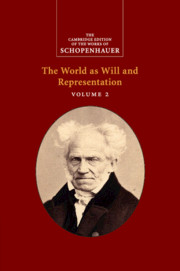Chapter 18 - On the Possibility of Cognizing the Thing in Itself
Published online by Cambridge University Press: 30 June 2022
Summary
This book contains what is most characteristic as well most important about my philosophy, namely the transition from appearance to thing in itself that Kant dismissed as impossible; and I have already published an essential supplement to it in 1836 under the title On Will in Nature (2nd edition, 1854). That text is small in scope but important in substance, and it would be a great mistake to treat those foreign expressions that I linked to my own explanations as its true content and theme: those expressions are rather merely the occasion for beginning my discussions of the fundamental truth of my teaching, which in fact I do more clearly than anywhere else, taking it as far as our empirical knowledge of nature. I do this most exhaustively and rigorously in the section entitled ‘Physical Astronomy’, and I could never hope to find a more accurate or exact expression of this kernel of my teaching than I have given there. So anyone who wants to become thoroughly acquainted with my philosophy and wishes to examine it seriously must take into account the above-mentioned section before anything else. In general therefore, everything said in that short work would have comprised the main content of the present supplements if I were not obliged to exclude it due to its prior appearance. However, I will assume that the reader is familiar with that text, since otherwise the very best part would be missing.
First of all I want to make some preliminary remarks from a general point of view about what it means to talk about cognition of the thing in itself, and about the necessary constraints on this meaning.
What is cognition? – It is first and foremost representation. – What is representation? – A very complicated physiological process in the brain of an animal that results in consciousness of an image precisely there. – Clearly such an image can refer only very indirectly to something so completely different from the animal in whose brain the image exists. – This is perhaps the simplest and most comprehensible way to expose the deep chasm between the ideal and the real.
- Type
- Chapter
- Information
- Schopenhauer: The World as Will and Representation , pp. 202 - 211Publisher: Cambridge University PressPrint publication year: 2018



